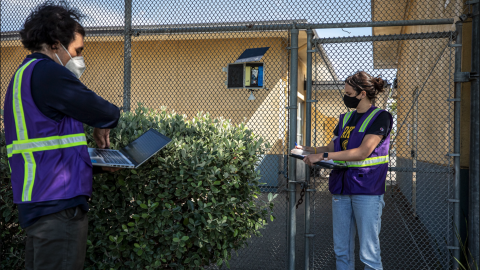Energy Equity
The Challenge
Underserved and overburdened communities are most at risk from the effects of climate change globally, and the steps we take to tackle the climate crisis and move away from our dependence on fossil fuels must result in affordable energy access for all and equitable distribution of the benefits of those energy and climate investments.
How are we making a difference?
The Energy Technologies Area (ETA) recognizes the need to conduct research and demonstrations at the community level, with input from and the participation of community partners, to align with community goals and values.
We have developed tools and resources to help facilitate a just and equitable energy transition. These tools include developing technologies that foster community resilience, increase access to transportation electrification, and decarbonize manufacturing and the grid.
BEAM CORE
Modeling Mobility for Cleaner Transportation
People in low-income communities face greater health risks from pollution related to transportation. A tool from Berkeley Lab models everyday travel decisions and simulates transportation options to anticipate effects on emissions, congestion, and energy use, as well as the mobility, cost, and health impacts. Developed in partnership with UrbanSim, Inc., the Behavior, Energy, Autonomy, and Mobility (BEAM) Comprehensive Regional Evaluator (CORE) Modeling Framework helps government agencies, policymakers, and businesses make informed and equitable planning decisions.
CAL-THRIVES
Protecting Vulnerable Residents from Extreme Heat
Heat is responsible for the largest number of weather-related deaths in the United States. The California Toolkit for Heat Resilience in Vulnerable Environments (CAL-THRIVES) software developed by Berkeley Lab in partnership with the City of Fresno, the California Environmental Commission, and the University of Southern California helps identify affordable, zero-energy measures that can keep low-income and elderly residents cool and safe during heat waves.
Communities & Partnerships
We partner with community-based organizations, public, and private agencies to ensure their needs and experiences inform our research. In this way, we are able to create technologies and solutions that will have real-world impact.
Efficient and Healthy Schools
Improving Air Quality and Student Performance
More than 1.5 million students at 2,600 schools will benefit from better air quality and energy efficiency based on Berkeley Lab technical assistance provided by a joint initiative of the Department of Energy, the Environmental Protection Agency, and the Department of Education. Well-ventilated classrooms with effective filtration systems can improve student performance and health in these low-income school districts.
Air Pollution Monitoring
Generating Data for Communities
Many underserved communities face disproportionate air pollution but lack resources to monitor it. In response, Berkeley Lab, in partnership with UC Berkeley and community-based organizations, deploys low-cost sensors in these areas to track neighborhood-level pollution. Since 2016, efforts in West Oakland, Richmond, Modesto, and San Francisco have generated data that inform policies to reduce pollution exposure and mitigate health impacts in the most affected communities.
Fresno Community Energy Action Plan
Building Healthier and More Energy Efficient Communities
Pollution, poor air quality, and inadequate air conditioning lead to health problems for many members of disadvantaged communities. A plan developed by Berkeley Lab in collaboration with local stakeholders combines energy efficiency, electrification, and distributed energy resources to deliver energy equity, air quality, and climate benefits. Researchers joined forces with the City of Fresno, the State of California, numerous other public and private agencies, and Central Valley community organizations to identify common goals and priorities.
EcoBlock
Putting Clean Energy in Reach for Low-Income City Neighborhoods
Clean energy and energy efficiency improvements can be too expensive for some homeowners and beyond the control of most renters. Led by UC Berkeley and funded by the California Energy Commission, the Oakland EcoBlock designed by Berkeley Lab combines a solar-powered microgrid, home retrofits, and shared electric vehicles to cut greenhouse gas emissions and electricity bills, while boosting energy savings for low-income urban dwellers.
New Solar Ownership Models
Reaching Millions of Households, Cutting Billions in Power Bills
Although solar energy costs continue to shrink, many low- and moderate-income homeowners and renters still cannot afford these renewable energy systems. Community solar projects offer multiple households and businesses affordable access to clean energy. In collaboration with more than 2,000 community stakeholders across the nation, Berkeley Lab provides free technical assistance through the National Community Solar Partnership, with goals to boost community solar deployment by 700%, reaching 5 million households and cutting $1 billion from power bills.
ETA scientists have several demonstration projects that prioritize underserved and overburdened community accessibility to new energy technologies and strategies.
Demographics of Rooftop Solar
Shedding Light on Inclusion Factors
Understanding who benefits — and who doesn’t — from the solar energy boom is one way to start closing gaps in clean energy equity. Berkeley Lab researchers have compiled demographic data on 3.3 million U.S. households, representing more than 85% of the nation’s rooftop-solar-powered homes. Information on factors including income, race, ethnicity, education level, occupation, age, and home value inform clean energy policies, to potentially make them more equitable for families in lower income brackets.
Outdoor Air Quality
Vehicle Air Pollution Emission Control Technologies
Heavy-duty diesel trucks are essential for the movement of goods in California and the nation, but they contribute significantly to the burden of diesel particulate matter and nitrogen oxides in the air. Nitrogen oxide emissions are linked to significant health impacts, and many low-income communities who live and work in close proximity to these sources of pollution have been more significantly impacted by these emissions. Berkeley Lab and UC Berkeley scientists work together to lead research in measuring the performance and durability of after-treatment emission control technologies as well as effectiveness of vehicle inspection and maintenance programs in reducing emissions from other vehicle types in compliance with EPA standards.
Indoor Air Quality
Protecting Indoor Air From Outdoor Pollution
Indoor air pollution from various sources can negatively affect health, productivity, and cognition. Researchers are exploring how to balance the need for ventilation with the reality that outdoor air often brings its own hazards. Historically underserved members of our communities in the Western U.S. are especially impacted by wildfire smoke and asthma. Recommended solutions include sealing ventilation during wildfires, using high-performance filters, and consumer-grade air quality monitors. Supported by the Department of Energy and the EPA, these strategies aim to ensure all Americans have clean, safe indoor air in energy-efficient buildings.

Air quality sensors are available to the public, but inequities in their adoption remain.

Berkeley Lab study shows how battery-electric trains can deliver environmental justice, cost-savings, and resilience to the U.S.

Berkeley Lab report outlines systemic changes needed to advance equity in electric utility regulation
